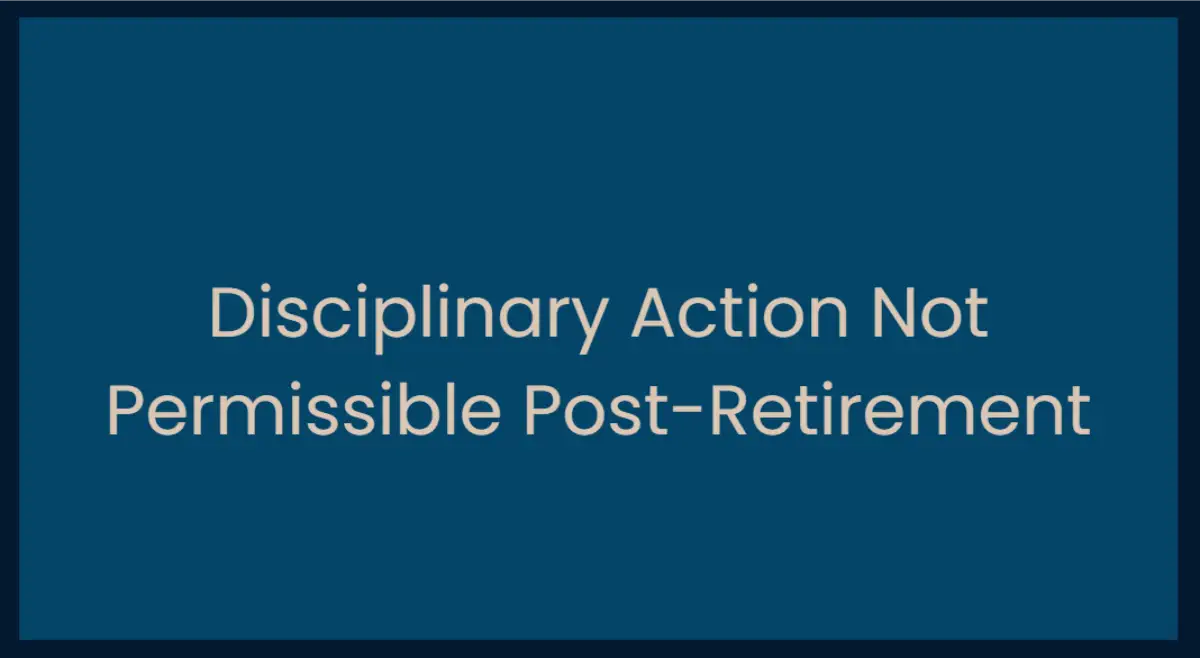Supreme Court Rules Against Disciplinary Action After Superannuation

In a pivotal ruling that affects employment and disciplinary procedures across public sector banks, the Supreme Court of India has ruled that disciplinary proceedings initiated after the superannuation of an employee are void. The ruling came in the case of State Bank of India & Ors. vs. Navin Kumar Sinha, where the court dismissed SBI’s appeal, reaffirming that disciplinary actions cannot be continued once an employee has retired, unless explicitly permitted by service rules.
Background of the Case
The dispute arose after Navin Kumar Sinha, a former officer of State Bank of India (SBI), was dismissed from service following a disciplinary proceeding. Sinha was initially set to retire on December 26, 2003, but was granted an extension of service until October 1, 2010. The disciplinary proceeding against him was initiated only on March 18, 2011, which was after his extended period of service had ended.
Sinha was accused of multiple violations, including sanctioning loans to family members without due approval and unauthorized transactions. He challenged his dismissal, leading to a series of appeals that culminated in this Supreme Court ruling.
The Court’s Key Observations
The Supreme Court, led by Justice Ujjal Bhuyan and Justice Abhay S. Oka, upheld the earlier judgments of the Jharkhand High Court, which had quashed the disciplinary actions taken against Sinha. The Court made the following key observations:
- Jurisdictional Limits: The disciplinary proceedings initiated after the respondent’s superannuation were declared void. The Court emphasized that once an officer retires, the employer has no jurisdiction to initiate disciplinary proceedings unless the service rules specifically allow for such actions.
- Service Rules Interpretation: The Court interpreted the State Bank of India Officers’ Service Rules, 1992, noting that under Rule 19(3), disciplinary proceedings may only continue post-retirement if they were initiated before superannuation. In Sinha’s case, no such proceedings were initiated before his retirement, rendering the subsequent actions unlawful.
- Master-Servant Relationship: It was noted that the master-servant relationship between SBI and Sinha ended on October 1, 2010, meaning that disciplinary actions taken after this date were non est in the eyes of the law.
Implications for Employers and Employees
The Supreme Court’s decision has several implications for both employers and employees:
- No Disciplinary Action Post-Retirement: Employers, particularly in the public sector, must ensure that any disciplinary proceedings against employees are initiated before their retirement or extension of service ends.
- Clarity in Service Rules: The ruling stresses the need for clear and specific service rules that outline when and how disciplinary actions can be pursued post-retirement.
- Protection for Retirees: For employees, this ruling provides a layer of protection against punitive actions initiated after their retirement, ensuring that their retirement benefits are not unjustly withheld.
Detailed Timeline of Events
- June 8, 1973: Navin Kumar Sinha joined SBI as a clerk typist.
- December 26, 2003: Sinha was due to superannuate but was granted an extension until October 1, 2010.
- August 18, 2009: SBI issued a notice alleging violations by Sinha, including unauthorized loans.
- August 21, 2009: Sinha was placed under suspension.
- March 18, 2011: Disciplinary proceedings were initiated, well after Sinha’s extended retirement date.
- March 7, 2012: Sinha was dismissed from service based on the findings of the disciplinary authority.
- September 6, 2016: The Jharkhand High Court quashed the dismissal, declaring the disciplinary proceedings void.
- February 11, 2020: The Division Bench of the High Court upheld the Single Bench’s decision, dismissing SBI’s appeal.
- November 19, 2024: The Supreme Court dismissed SBI’s appeal, affirming the decisions of the lower courts.
Court’s Final Order
The Supreme Court directed SBI to release all the service dues of Navin Kumar Sinha within six weeks from the date of the judgment. The Court also observed that the disciplinary actions were unjustified given that they were initiated after Sinha had ceased to be in service, making the proceedings void ab initio.




